Equity and Trust Report: Fiduciary Duties and Secret Trust Analysis
VerifiedAdded on 2020/12/09
|8
|2413
|137
Report
AI Summary
This report provides a comprehensive overview of equity and trust, focusing on the critical aspects of fiduciary duties and secret trusts within the legal framework. It begins by defining equity and trust, emphasizing their roles in ensuring fairness and justice. The report delves into the fiduciary duties of a trustee, including the duty of care, duty to secure and safeguard assets, duty of loyalty, duty to account, power to invest, and power to segregate, illustrating their importance through the case of Boardman v Phipps (1967). The second part of the report analyzes a case study involving Annie's will, which highlights the application of secret trust law, differentiating between fully secret and half secret trusts. The analysis examines how James and Hannah are handling Annie's wishes, and how their actions align with the legal principles of secret trusts, referencing the case of Ottoway v Norman (1972). The report concludes by summarizing the key concepts and the significance of equity and trust in legal practice.

EQUITY AND TRUST
Paraphrase This Document
Need a fresh take? Get an instant paraphrase of this document with our AI Paraphraser
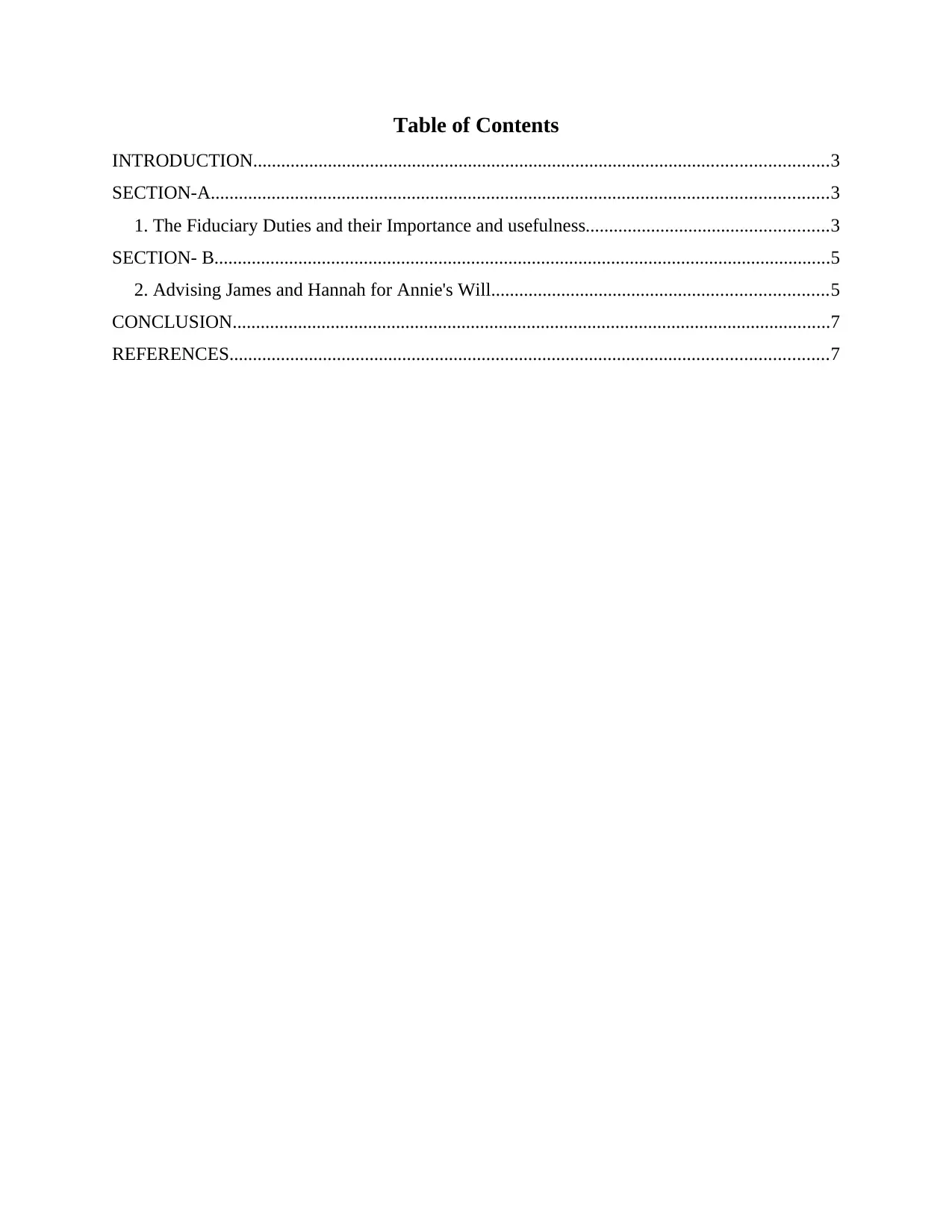
Table of Contents
INTRODUCTION...........................................................................................................................3
SECTION-A....................................................................................................................................3
1. The Fiduciary Duties and their Importance and usefulness....................................................3
SECTION- B....................................................................................................................................5
2. Advising James and Hannah for Annie's Will........................................................................5
CONCLUSION................................................................................................................................7
REFERENCES................................................................................................................................7
INTRODUCTION...........................................................................................................................3
SECTION-A....................................................................................................................................3
1. The Fiduciary Duties and their Importance and usefulness....................................................3
SECTION- B....................................................................................................................................5
2. Advising James and Hannah for Annie's Will........................................................................5
CONCLUSION................................................................................................................................7
REFERENCES................................................................................................................................7
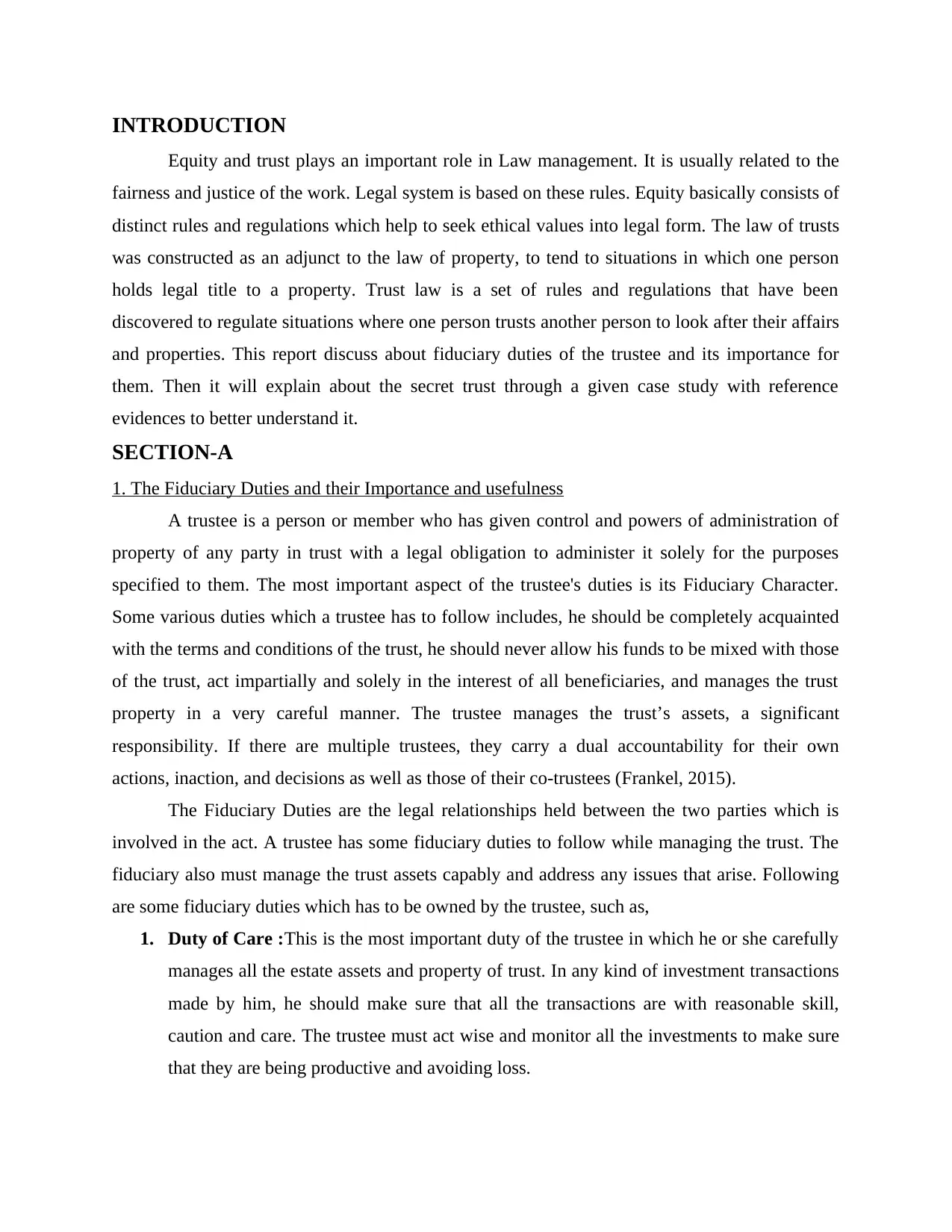
INTRODUCTION
Equity and trust plays an important role in Law management. It is usually related to the
fairness and justice of the work. Legal system is based on these rules. Equity basically consists of
distinct rules and regulations which help to seek ethical values into legal form. The law of trusts
was constructed as an adjunct to the law of property, to tend to situations in which one person
holds legal title to a property. Trust law is a set of rules and regulations that have been
discovered to regulate situations where one person trusts another person to look after their affairs
and properties. This report discuss about fiduciary duties of the trustee and its importance for
them. Then it will explain about the secret trust through a given case study with reference
evidences to better understand it.
SECTION-A
1. The Fiduciary Duties and their Importance and usefulness
A trustee is a person or member who has given control and powers of administration of
property of any party in trust with a legal obligation to administer it solely for the purposes
specified to them. The most important aspect of the trustee's duties is its Fiduciary Character.
Some various duties which a trustee has to follow includes, he should be completely acquainted
with the terms and conditions of the trust, he should never allow his funds to be mixed with those
of the trust, act impartially and solely in the interest of all beneficiaries, and manages the trust
property in a very careful manner. The trustee manages the trust’s assets, a significant
responsibility. If there are multiple trustees, they carry a dual accountability for their own
actions, inaction, and decisions as well as those of their co-trustees (Frankel, 2015).
The Fiduciary Duties are the legal relationships held between the two parties which is
involved in the act. A trustee has some fiduciary duties to follow while managing the trust. The
fiduciary also must manage the trust assets capably and address any issues that arise. Following
are some fiduciary duties which has to be owned by the trustee, such as,
1. Duty of Care :This is the most important duty of the trustee in which he or she carefully
manages all the estate assets and property of trust. In any kind of investment transactions
made by him, he should make sure that all the transactions are with reasonable skill,
caution and care. The trustee must act wise and monitor all the investments to make sure
that they are being productive and avoiding loss.
Equity and trust plays an important role in Law management. It is usually related to the
fairness and justice of the work. Legal system is based on these rules. Equity basically consists of
distinct rules and regulations which help to seek ethical values into legal form. The law of trusts
was constructed as an adjunct to the law of property, to tend to situations in which one person
holds legal title to a property. Trust law is a set of rules and regulations that have been
discovered to regulate situations where one person trusts another person to look after their affairs
and properties. This report discuss about fiduciary duties of the trustee and its importance for
them. Then it will explain about the secret trust through a given case study with reference
evidences to better understand it.
SECTION-A
1. The Fiduciary Duties and their Importance and usefulness
A trustee is a person or member who has given control and powers of administration of
property of any party in trust with a legal obligation to administer it solely for the purposes
specified to them. The most important aspect of the trustee's duties is its Fiduciary Character.
Some various duties which a trustee has to follow includes, he should be completely acquainted
with the terms and conditions of the trust, he should never allow his funds to be mixed with those
of the trust, act impartially and solely in the interest of all beneficiaries, and manages the trust
property in a very careful manner. The trustee manages the trust’s assets, a significant
responsibility. If there are multiple trustees, they carry a dual accountability for their own
actions, inaction, and decisions as well as those of their co-trustees (Frankel, 2015).
The Fiduciary Duties are the legal relationships held between the two parties which is
involved in the act. A trustee has some fiduciary duties to follow while managing the trust. The
fiduciary also must manage the trust assets capably and address any issues that arise. Following
are some fiduciary duties which has to be owned by the trustee, such as,
1. Duty of Care :This is the most important duty of the trustee in which he or she carefully
manages all the estate assets and property of trust. In any kind of investment transactions
made by him, he should make sure that all the transactions are with reasonable skill,
caution and care. The trustee must act wise and monitor all the investments to make sure
that they are being productive and avoiding loss.
⊘ This is a preview!⊘
Do you want full access?
Subscribe today to unlock all pages.

Trusted by 1+ million students worldwide
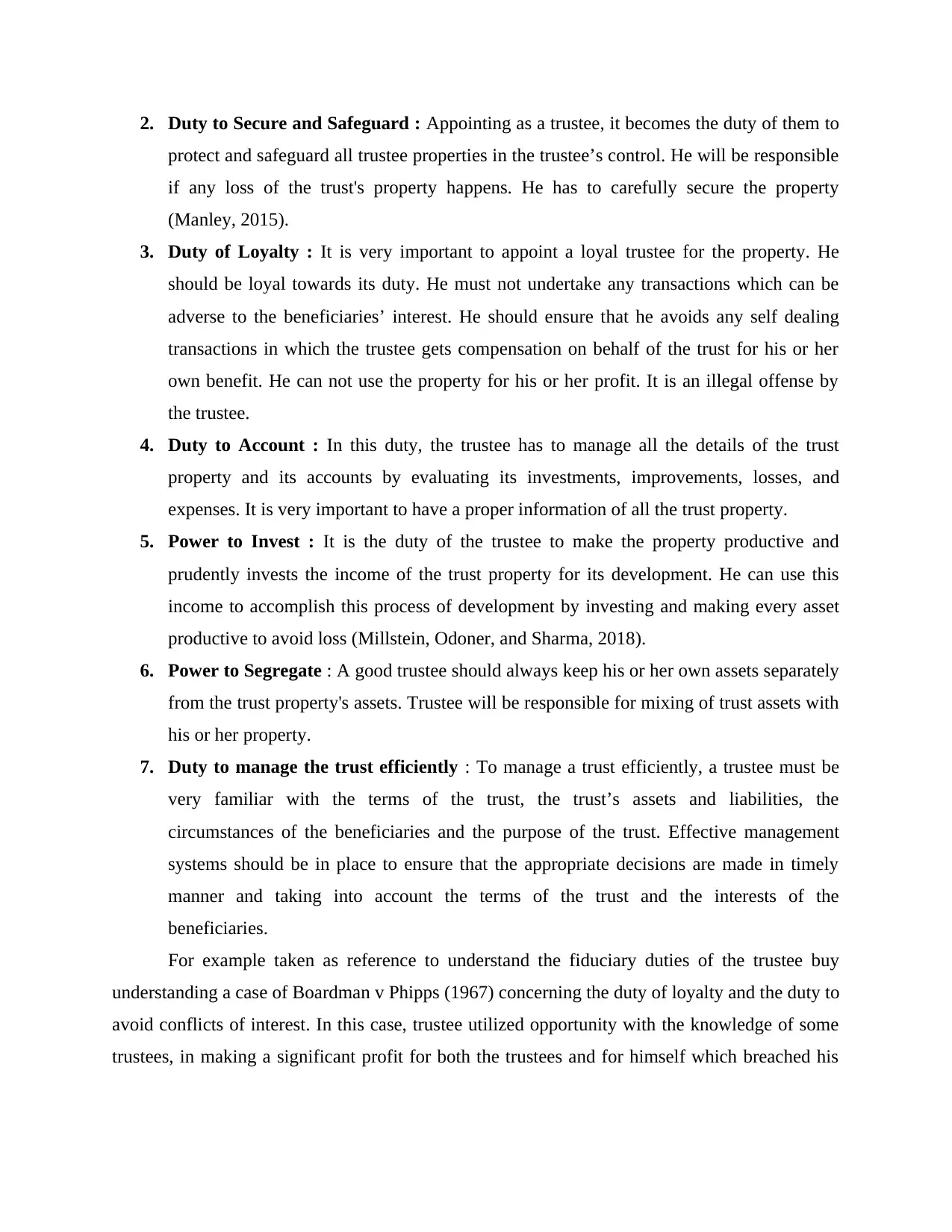
2. Duty to Secure and Safeguard : Appointing as a trustee, it becomes the duty of them to
protect and safeguard all trustee properties in the trustee’s control. He will be responsible
if any loss of the trust's property happens. He has to carefully secure the property
(Manley, 2015).
3. Duty of Loyalty : It is very important to appoint a loyal trustee for the property. He
should be loyal towards its duty. He must not undertake any transactions which can be
adverse to the beneficiaries’ interest. He should ensure that he avoids any self dealing
transactions in which the trustee gets compensation on behalf of the trust for his or her
own benefit. He can not use the property for his or her profit. It is an illegal offense by
the trustee.
4. Duty to Account : In this duty, the trustee has to manage all the details of the trust
property and its accounts by evaluating its investments, improvements, losses, and
expenses. It is very important to have a proper information of all the trust property.
5. Power to Invest : It is the duty of the trustee to make the property productive and
prudently invests the income of the trust property for its development. He can use this
income to accomplish this process of development by investing and making every asset
productive to avoid loss (Millstein, Odoner, and Sharma, 2018).
6. Power to Segregate : A good trustee should always keep his or her own assets separately
from the trust property's assets. Trustee will be responsible for mixing of trust assets with
his or her property.
7. Duty to manage the trust efficiently : To manage a trust efficiently, a trustee must be
very familiar with the terms of the trust, the trust’s assets and liabilities, the
circumstances of the beneficiaries and the purpose of the trust. Effective management
systems should be in place to ensure that the appropriate decisions are made in timely
manner and taking into account the terms of the trust and the interests of the
beneficiaries.
For example taken as reference to understand the fiduciary duties of the trustee buy
understanding a case of Boardman v Phipps (1967) concerning the duty of loyalty and the duty to
avoid conflicts of interest. In this case, trustee utilized opportunity with the knowledge of some
trustees, in making a significant profit for both the trustees and for himself which breached his
protect and safeguard all trustee properties in the trustee’s control. He will be responsible
if any loss of the trust's property happens. He has to carefully secure the property
(Manley, 2015).
3. Duty of Loyalty : It is very important to appoint a loyal trustee for the property. He
should be loyal towards its duty. He must not undertake any transactions which can be
adverse to the beneficiaries’ interest. He should ensure that he avoids any self dealing
transactions in which the trustee gets compensation on behalf of the trust for his or her
own benefit. He can not use the property for his or her profit. It is an illegal offense by
the trustee.
4. Duty to Account : In this duty, the trustee has to manage all the details of the trust
property and its accounts by evaluating its investments, improvements, losses, and
expenses. It is very important to have a proper information of all the trust property.
5. Power to Invest : It is the duty of the trustee to make the property productive and
prudently invests the income of the trust property for its development. He can use this
income to accomplish this process of development by investing and making every asset
productive to avoid loss (Millstein, Odoner, and Sharma, 2018).
6. Power to Segregate : A good trustee should always keep his or her own assets separately
from the trust property's assets. Trustee will be responsible for mixing of trust assets with
his or her property.
7. Duty to manage the trust efficiently : To manage a trust efficiently, a trustee must be
very familiar with the terms of the trust, the trust’s assets and liabilities, the
circumstances of the beneficiaries and the purpose of the trust. Effective management
systems should be in place to ensure that the appropriate decisions are made in timely
manner and taking into account the terms of the trust and the interests of the
beneficiaries.
For example taken as reference to understand the fiduciary duties of the trustee buy
understanding a case of Boardman v Phipps (1967) concerning the duty of loyalty and the duty to
avoid conflicts of interest. In this case, trustee utilized opportunity with the knowledge of some
trustees, in making a significant profit for both the trustees and for himself which breached his
Paraphrase This Document
Need a fresh take? Get an instant paraphrase of this document with our AI Paraphraser
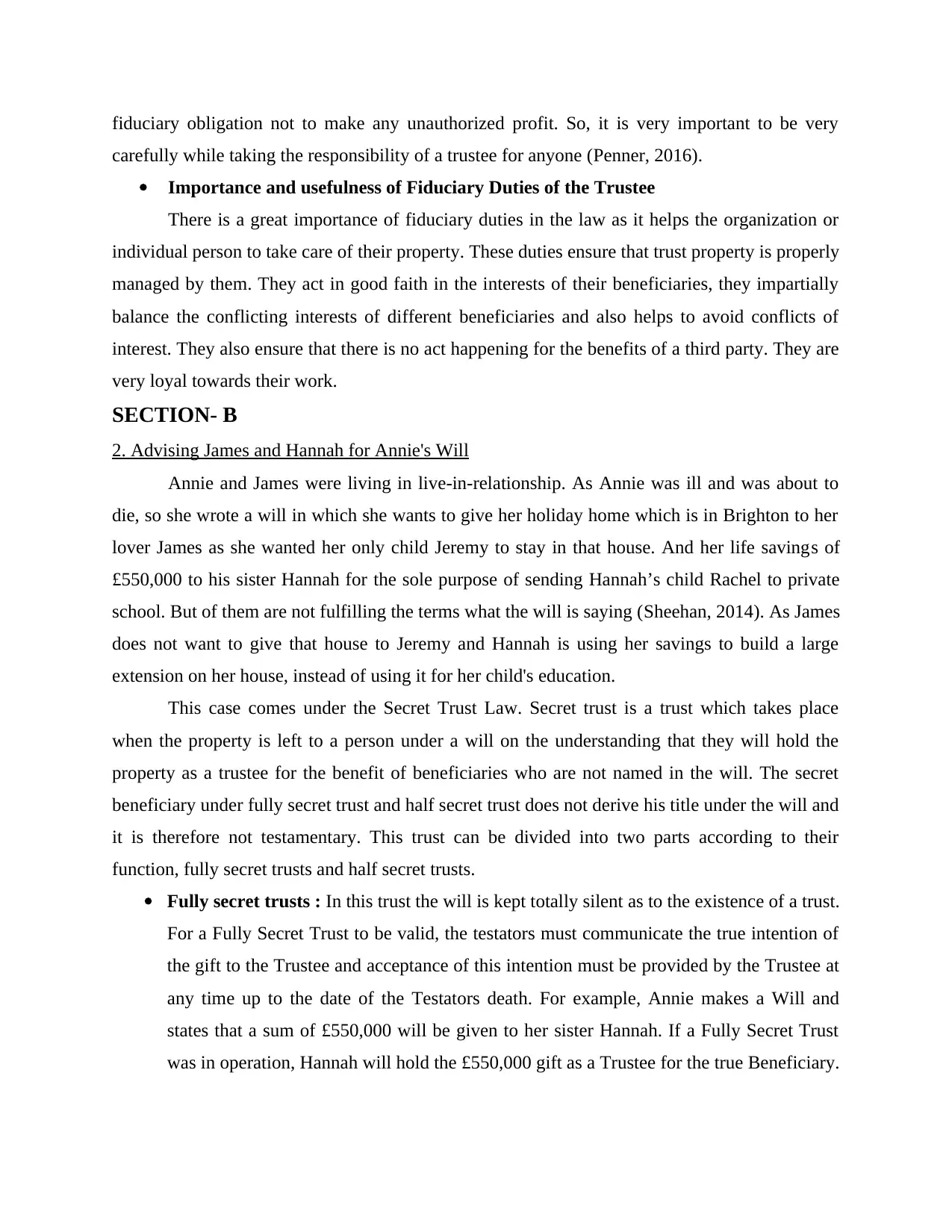
fiduciary obligation not to make any unauthorized profit. So, it is very important to be very
carefully while taking the responsibility of a trustee for anyone (Penner, 2016).
Importance and usefulness of Fiduciary Duties of the Trustee
There is a great importance of fiduciary duties in the law as it helps the organization or
individual person to take care of their property. These duties ensure that trust property is properly
managed by them. They act in good faith in the interests of their beneficiaries, they impartially
balance the conflicting interests of different beneficiaries and also helps to avoid conflicts of
interest. They also ensure that there is no act happening for the benefits of a third party. They are
very loyal towards their work.
SECTION- B
2. Advising James and Hannah for Annie's Will
Annie and James were living in live-in-relationship. As Annie was ill and was about to
die, so she wrote a will in which she wants to give her holiday home which is in Brighton to her
lover James as she wanted her only child Jeremy to stay in that house. And her life savings of
£550,000 to his sister Hannah for the sole purpose of sending Hannah’s child Rachel to private
school. But of them are not fulfilling the terms what the will is saying (Sheehan, 2014). As James
does not want to give that house to Jeremy and Hannah is using her savings to build a large
extension on her house, instead of using it for her child's education.
This case comes under the Secret Trust Law. Secret trust is a trust which takes place
when the property is left to a person under a will on the understanding that they will hold the
property as a trustee for the benefit of beneficiaries who are not named in the will. The secret
beneficiary under fully secret trust and half secret trust does not derive his title under the will and
it is therefore not testamentary. This trust can be divided into two parts according to their
function, fully secret trusts and half secret trusts.
Fully secret trusts : In this trust the will is kept totally silent as to the existence of a trust.
For a Fully Secret Trust to be valid, the testators must communicate the true intention of
the gift to the Trustee and acceptance of this intention must be provided by the Trustee at
any time up to the date of the Testators death. For example, Annie makes a Will and
states that a sum of £550,000 will be given to her sister Hannah. If a Fully Secret Trust
was in operation, Hannah will hold the £550,000 gift as a Trustee for the true Beneficiary.
carefully while taking the responsibility of a trustee for anyone (Penner, 2016).
Importance and usefulness of Fiduciary Duties of the Trustee
There is a great importance of fiduciary duties in the law as it helps the organization or
individual person to take care of their property. These duties ensure that trust property is properly
managed by them. They act in good faith in the interests of their beneficiaries, they impartially
balance the conflicting interests of different beneficiaries and also helps to avoid conflicts of
interest. They also ensure that there is no act happening for the benefits of a third party. They are
very loyal towards their work.
SECTION- B
2. Advising James and Hannah for Annie's Will
Annie and James were living in live-in-relationship. As Annie was ill and was about to
die, so she wrote a will in which she wants to give her holiday home which is in Brighton to her
lover James as she wanted her only child Jeremy to stay in that house. And her life savings of
£550,000 to his sister Hannah for the sole purpose of sending Hannah’s child Rachel to private
school. But of them are not fulfilling the terms what the will is saying (Sheehan, 2014). As James
does not want to give that house to Jeremy and Hannah is using her savings to build a large
extension on her house, instead of using it for her child's education.
This case comes under the Secret Trust Law. Secret trust is a trust which takes place
when the property is left to a person under a will on the understanding that they will hold the
property as a trustee for the benefit of beneficiaries who are not named in the will. The secret
beneficiary under fully secret trust and half secret trust does not derive his title under the will and
it is therefore not testamentary. This trust can be divided into two parts according to their
function, fully secret trusts and half secret trusts.
Fully secret trusts : In this trust the will is kept totally silent as to the existence of a trust.
For a Fully Secret Trust to be valid, the testators must communicate the true intention of
the gift to the Trustee and acceptance of this intention must be provided by the Trustee at
any time up to the date of the Testators death. For example, Annie makes a Will and
states that a sum of £550,000 will be given to her sister Hannah. If a Fully Secret Trust
was in operation, Hannah will hold the £550,000 gift as a Trustee for the true Beneficiary.
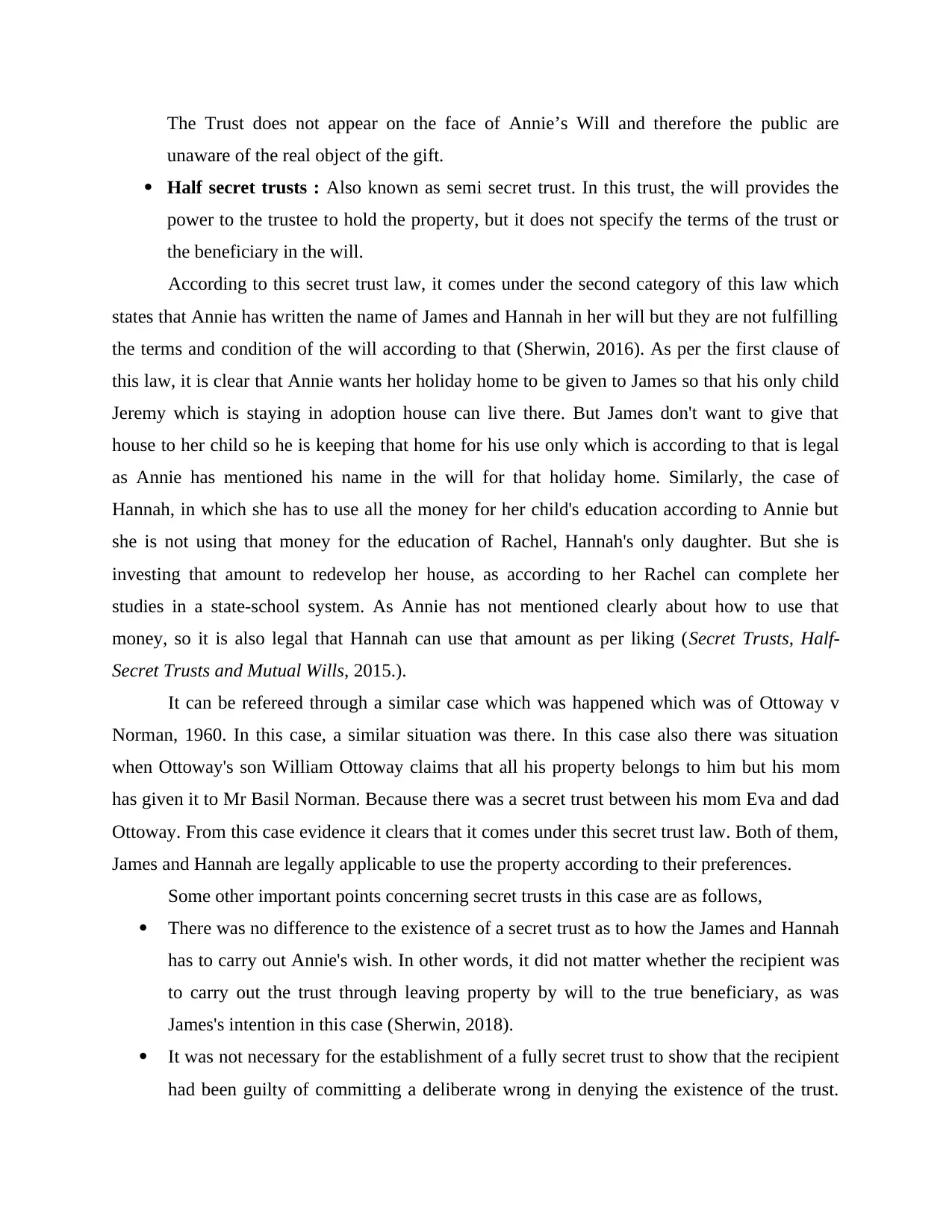
The Trust does not appear on the face of Annie’s Will and therefore the public are
unaware of the real object of the gift.
Half secret trusts : Also known as semi secret trust. In this trust, the will provides the
power to the trustee to hold the property, but it does not specify the terms of the trust or
the beneficiary in the will.
According to this secret trust law, it comes under the second category of this law which
states that Annie has written the name of James and Hannah in her will but they are not fulfilling
the terms and condition of the will according to that (Sherwin, 2016). As per the first clause of
this law, it is clear that Annie wants her holiday home to be given to James so that his only child
Jeremy which is staying in adoption house can live there. But James don't want to give that
house to her child so he is keeping that home for his use only which is according to that is legal
as Annie has mentioned his name in the will for that holiday home. Similarly, the case of
Hannah, in which she has to use all the money for her child's education according to Annie but
she is not using that money for the education of Rachel, Hannah's only daughter. But she is
investing that amount to redevelop her house, as according to her Rachel can complete her
studies in a state-school system. As Annie has not mentioned clearly about how to use that
money, so it is also legal that Hannah can use that amount as per liking (Secret Trusts, Half-
Secret Trusts and Mutual Wills, 2015.).
It can be refereed through a similar case which was happened which was of Ottoway v
Norman, 1960. In this case, a similar situation was there. In this case also there was situation
when Ottoway's son William Ottoway claims that all his property belongs to him but his mom
has given it to Mr Basil Norman. Because there was a secret trust between his mom Eva and dad
Ottoway. From this case evidence it clears that it comes under this secret trust law. Both of them,
James and Hannah are legally applicable to use the property according to their preferences.
Some other important points concerning secret trusts in this case are as follows,
There was no difference to the existence of a secret trust as to how the James and Hannah
has to carry out Annie's wish. In other words, it did not matter whether the recipient was
to carry out the trust through leaving property by will to the true beneficiary, as was
James's intention in this case (Sherwin, 2018).
It was not necessary for the establishment of a fully secret trust to show that the recipient
had been guilty of committing a deliberate wrong in denying the existence of the trust.
unaware of the real object of the gift.
Half secret trusts : Also known as semi secret trust. In this trust, the will provides the
power to the trustee to hold the property, but it does not specify the terms of the trust or
the beneficiary in the will.
According to this secret trust law, it comes under the second category of this law which
states that Annie has written the name of James and Hannah in her will but they are not fulfilling
the terms and condition of the will according to that (Sherwin, 2016). As per the first clause of
this law, it is clear that Annie wants her holiday home to be given to James so that his only child
Jeremy which is staying in adoption house can live there. But James don't want to give that
house to her child so he is keeping that home for his use only which is according to that is legal
as Annie has mentioned his name in the will for that holiday home. Similarly, the case of
Hannah, in which she has to use all the money for her child's education according to Annie but
she is not using that money for the education of Rachel, Hannah's only daughter. But she is
investing that amount to redevelop her house, as according to her Rachel can complete her
studies in a state-school system. As Annie has not mentioned clearly about how to use that
money, so it is also legal that Hannah can use that amount as per liking (Secret Trusts, Half-
Secret Trusts and Mutual Wills, 2015.).
It can be refereed through a similar case which was happened which was of Ottoway v
Norman, 1960. In this case, a similar situation was there. In this case also there was situation
when Ottoway's son William Ottoway claims that all his property belongs to him but his mom
has given it to Mr Basil Norman. Because there was a secret trust between his mom Eva and dad
Ottoway. From this case evidence it clears that it comes under this secret trust law. Both of them,
James and Hannah are legally applicable to use the property according to their preferences.
Some other important points concerning secret trusts in this case are as follows,
There was no difference to the existence of a secret trust as to how the James and Hannah
has to carry out Annie's wish. In other words, it did not matter whether the recipient was
to carry out the trust through leaving property by will to the true beneficiary, as was
James's intention in this case (Sherwin, 2018).
It was not necessary for the establishment of a fully secret trust to show that the recipient
had been guilty of committing a deliberate wrong in denying the existence of the trust.
⊘ This is a preview!⊘
Do you want full access?
Subscribe today to unlock all pages.

Trusted by 1+ million students worldwide
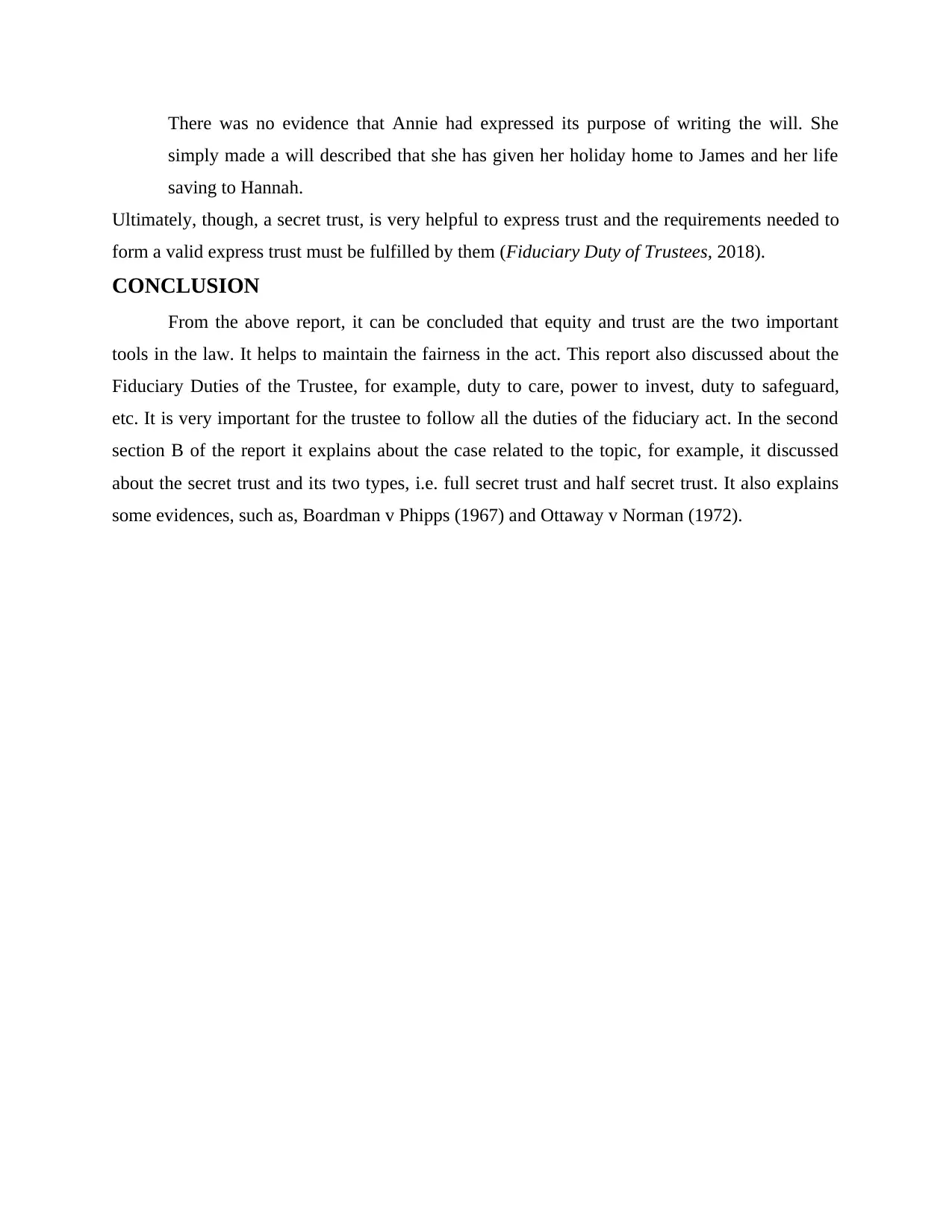
There was no evidence that Annie had expressed its purpose of writing the will. She
simply made a will described that she has given her holiday home to James and her life
saving to Hannah.
Ultimately, though, a secret trust, is very helpful to express trust and the requirements needed to
form a valid express trust must be fulfilled by them (Fiduciary Duty of Trustees, 2018).
CONCLUSION
From the above report, it can be concluded that equity and trust are the two important
tools in the law. It helps to maintain the fairness in the act. This report also discussed about the
Fiduciary Duties of the Trustee, for example, duty to care, power to invest, duty to safeguard,
etc. It is very important for the trustee to follow all the duties of the fiduciary act. In the second
section B of the report it explains about the case related to the topic, for example, it discussed
about the secret trust and its two types, i.e. full secret trust and half secret trust. It also explains
some evidences, such as, Boardman v Phipps (1967) and Ottaway v Norman (1972).
simply made a will described that she has given her holiday home to James and her life
saving to Hannah.
Ultimately, though, a secret trust, is very helpful to express trust and the requirements needed to
form a valid express trust must be fulfilled by them (Fiduciary Duty of Trustees, 2018).
CONCLUSION
From the above report, it can be concluded that equity and trust are the two important
tools in the law. It helps to maintain the fairness in the act. This report also discussed about the
Fiduciary Duties of the Trustee, for example, duty to care, power to invest, duty to safeguard,
etc. It is very important for the trustee to follow all the duties of the fiduciary act. In the second
section B of the report it explains about the case related to the topic, for example, it discussed
about the secret trust and its two types, i.e. full secret trust and half secret trust. It also explains
some evidences, such as, Boardman v Phipps (1967) and Ottaway v Norman (1972).
Paraphrase This Document
Need a fresh take? Get an instant paraphrase of this document with our AI Paraphraser
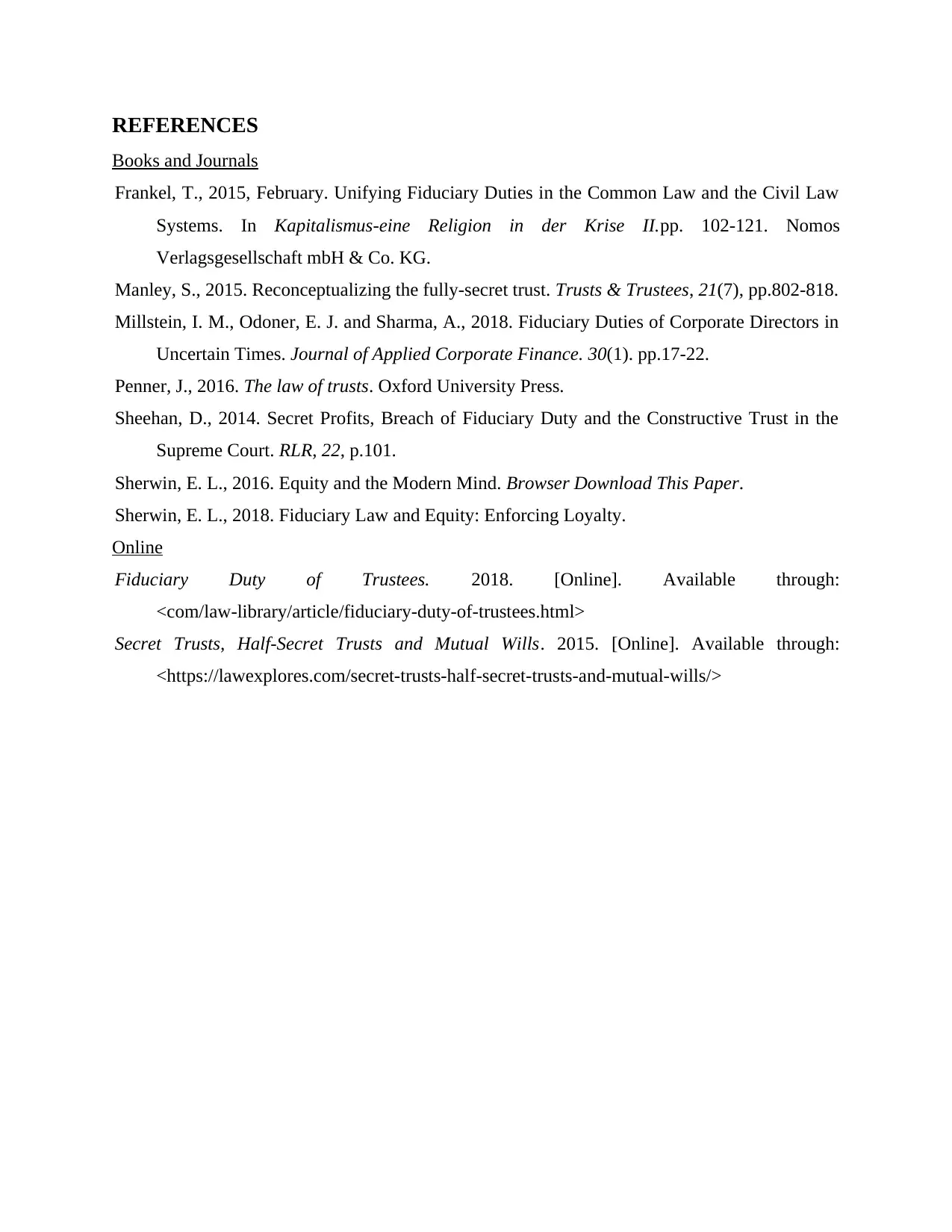
REFERENCES
Books and Journals
Frankel, T., 2015, February. Unifying Fiduciary Duties in the Common Law and the Civil Law
Systems. In Kapitalismus-eine Religion in der Krise II.pp. 102-121. Nomos
Verlagsgesellschaft mbH & Co. KG.
Manley, S., 2015. Reconceptualizing the fully-secret trust. Trusts & Trustees, 21(7), pp.802-818.
Millstein, I. M., Odoner, E. J. and Sharma, A., 2018. Fiduciary Duties of Corporate Directors in
Uncertain Times. Journal of Applied Corporate Finance. 30(1). pp.17-22.
Penner, J., 2016. The law of trusts. Oxford University Press.
Sheehan, D., 2014. Secret Profits, Breach of Fiduciary Duty and the Constructive Trust in the
Supreme Court. RLR, 22, p.101.
Sherwin, E. L., 2016. Equity and the Modern Mind. Browser Download This Paper.
Sherwin, E. L., 2018. Fiduciary Law and Equity: Enforcing Loyalty.
Online
Fiduciary Duty of Trustees. 2018. [Online]. Available through:
<com/law-library/article/fiduciary-duty-of-trustees.html>
Secret Trusts, Half-Secret Trusts and Mutual Wills. 2015. [Online]. Available through:
<https://lawexplores.com/secret-trusts-half-secret-trusts-and-mutual-wills/>
Books and Journals
Frankel, T., 2015, February. Unifying Fiduciary Duties in the Common Law and the Civil Law
Systems. In Kapitalismus-eine Religion in der Krise II.pp. 102-121. Nomos
Verlagsgesellschaft mbH & Co. KG.
Manley, S., 2015. Reconceptualizing the fully-secret trust. Trusts & Trustees, 21(7), pp.802-818.
Millstein, I. M., Odoner, E. J. and Sharma, A., 2018. Fiduciary Duties of Corporate Directors in
Uncertain Times. Journal of Applied Corporate Finance. 30(1). pp.17-22.
Penner, J., 2016. The law of trusts. Oxford University Press.
Sheehan, D., 2014. Secret Profits, Breach of Fiduciary Duty and the Constructive Trust in the
Supreme Court. RLR, 22, p.101.
Sherwin, E. L., 2016. Equity and the Modern Mind. Browser Download This Paper.
Sherwin, E. L., 2018. Fiduciary Law and Equity: Enforcing Loyalty.
Online
Fiduciary Duty of Trustees. 2018. [Online]. Available through:
<com/law-library/article/fiduciary-duty-of-trustees.html>
Secret Trusts, Half-Secret Trusts and Mutual Wills. 2015. [Online]. Available through:
<https://lawexplores.com/secret-trusts-half-secret-trusts-and-mutual-wills/>
1 out of 8
Related Documents
Your All-in-One AI-Powered Toolkit for Academic Success.
+13062052269
info@desklib.com
Available 24*7 on WhatsApp / Email
![[object Object]](/_next/static/media/star-bottom.7253800d.svg)
Unlock your academic potential
Copyright © 2020–2026 A2Z Services. All Rights Reserved. Developed and managed by ZUCOL.





